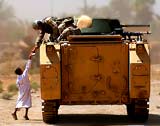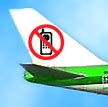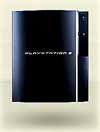 'Mission creep' in the Iraq conflict dropped US chances of success from 70 percent to 26 percent, says a University of Georgia researcher. The predictions were produced with a statistics-based approach that has proved accurate in 80 percent of former conflicts, claims assistant professor Patricia L. Sullivan of the UGA School of Public and International affairs.
'Mission creep' in the Iraq conflict dropped US chances of success from 70 percent to 26 percent, says a University of Georgia researcher. The predictions were produced with a statistics-based approach that has proved accurate in 80 percent of former conflicts, claims assistant professor Patricia L. Sullivan of the UGA School of Public and International affairs.
“No one could have predicted exactly what would happen after we overthrew the regime of Saddam Hussein,” said Sullivan. “But what my model could say was that if the population was not supportive of whatever new regime we put in power and the American strategic objective shifted from regime removal to maintaining the authority of a new government, the likelihood of a successful outcome would drop from almost 70 percent to just under 26 percent.”
Soviet chances in Afghanistan: only seven percent
The same statistical approach indicated a 93 percent change of success in achieving the goals of the first Gulf war in 1991, and a seven percent change of success for the Soviet Union's invasion of Afghanistan in the late 1970s.
“If you know some key variables – like the major objective, the nature of the target, whether there’s going to be another strong state that will intervene on the side of the target and whether you’ll have an ally – you can get a sense of your probability of victory,” said Sullivan.
She applied the technique to 122 post-World War II conflicts where major world powers faced a weaker opponent – to refine it and test its accuracy. The method developed predicts the outcome of these historical conflicts with 80 percent accuracy, when given the starting conditions.
Sullivan's model currently predicts a 26 percent chance of success for the Iraq war during the next decade.
When brute force prevails
A key factor separating likely success from probable failure is whether brute force alone is enough to overwhelm an opponent, Sullivan's model shows. Lengthy and complex conflicts that require cooperation from the adversary are less likely to succeed. The first Gulf War, with its limited objectives, rapidly achieved, is an example of the former, while the current conflict is an example of the latter.
 Sullivan disagrees with researchers who blame a lack of resolve for powerful nations' failure to win wars – such as the US Vietnam conflict. While resolve is a factor, she believes this alone does not predict success or failure. In fact, the first Gulf War was preceded by doom-laden predictions of a long and vicious conflict from many respected figures, she points out.
Sullivan disagrees with researchers who blame a lack of resolve for powerful nations' failure to win wars – such as the US Vietnam conflict. While resolve is a factor, she believes this alone does not predict success or failure. In fact, the first Gulf War was preceded by doom-laden predictions of a long and vicious conflict from many respected figures, she points out.
In a paper published last year, Sullivan said “The more the actual costs of victory exceed a state’s pre-war expectations, the greater the risk that it will be pushed beyond its cost-tolerance threshold and forced to unilaterally withdraw its forces before it attains its war aims.”
She continues “U.S. decision makers have repeatedly underestimated the cost of attaining war aims that are dependent on target compliance.”
Further Reading:
Sullivan's latest study is published in full in the Journal of Conflict Resolution's June edition - Link to online summary. Link to University of Georgia press release. Sullivan's 2006 paper, “What Price Victory? When Leaders Underestimate the Cost of War” (PDF)









